You’ve probably heard multiple times that keyword cannibalization affects your rankings and your whole website. Lots of experts and Google officials started to warn us to avoid falling into this trap and start optimizing each page for a unique keyword, adding unique title tags and meta descriptions.
Keyword cannibalization was a term that SEO world came up to explain some difficulties in helping and indicating Google to rank the page that they wanted when local searches didn’t exist and contextual results weren’t a thing. The idea was born when they tried to explain the next situation: “I have a page targeting «best tacos in Chicago» and another one targeting «best tacos in Austin». Should I or shouldn’t I use the word Chicago on my «best tacos in Austin» page? How do I link between them? How will Google know to rank the relevant page for each keyword?”
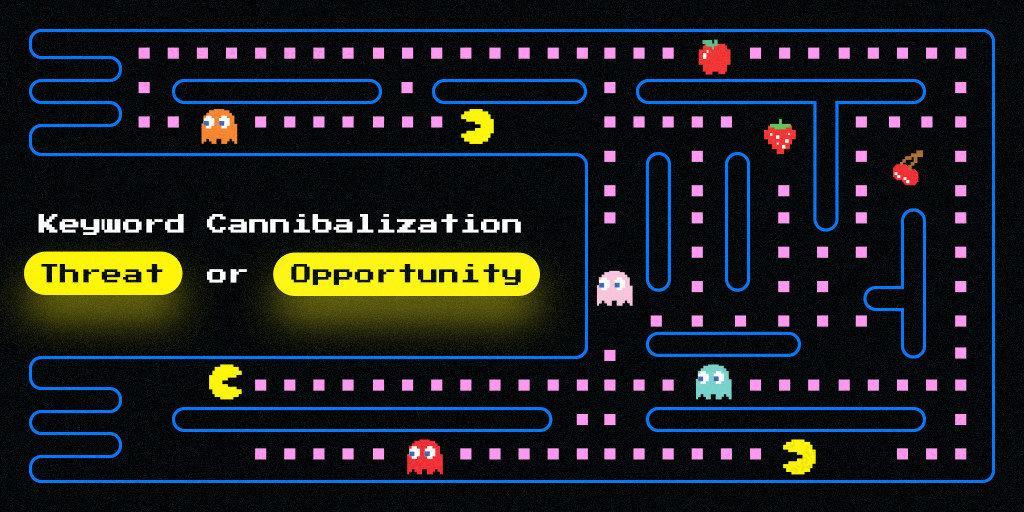
Today, the reality is different, Google has evolved, and its algorithms became smarter. So there are a few questions that need to be asked again to see if keyword cannibalization is still an issue or rather an opportunity.
- Google’s Opinion on Keyword Cannibalization
- Is Keyword Cannibalization an Issue?
- How to Identify and Remove Keyword Cannibalization
- How to Solve Keyword Cannibalization
| Keyword cannibalization is often overlooked either based on the same company having numerous websites within the same group of sites competing against each other, or single site topical cannibalization based on lack of clarity on sitewide page topic hierarchy. For both areas, the key initial expert action is deciding which page/site/entity is intended to rank primarily for that topic/term/group of terms, and sculpt every relevant signal to reinforce and clarify that intended outcome. | |
| Lee Wilson | |
| Head of SEO Vertical Leap | |
Keyword cannibalization is bad when pages with duplicate content, from the same domain, ranks for the same keyword. We found lots of examples, some of them bad, some of them are recommendations of best practices. If you check today’s article you’ll find out what you should do to avoid bad ranking situation, how to identify and avoid keyword cannibalization with a proper content optimization tool.
1. Google’s Opinion on Keyword Cannibalization
We all know keyword cannibalization appeared as a big no-no. Back in that time, Google didn’t have algorithms that were as sophisticated as today so it can choose and rank the relevant page for a specific keyword.
At the moment, Google crawls all the web pages where it sees lots of different pages that have relevant content for the same keyword. Afterward, it has to choose between those pages and show only that page that is accurate.
If you take a look at the example below, you can see an example of a real keyword cannibalization of two similar pages from the same domain, with the same title tags and similar topic discussion:
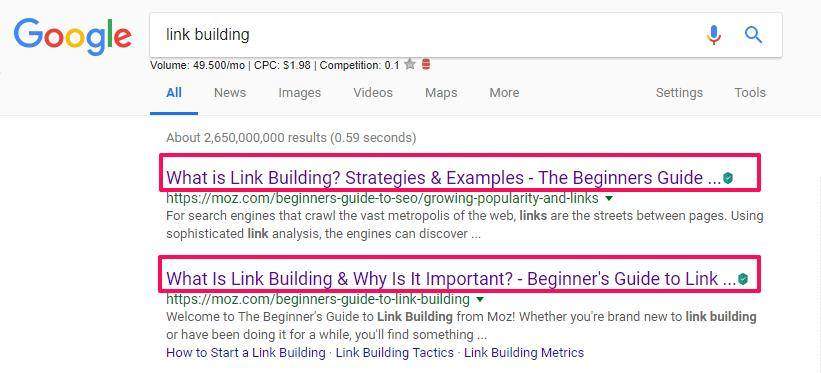
As you can see, the pages have a similar topic discussion, but they are both ranking very well.
The problem with keyword cannibalization started when somebody found out about this clinch and optimized lots of pages for the same keyword.
It was the rise of a black hat SEO strategy like every other good strategy that turned into the dark area.
In time, Google started to get more sophisticated and now understands the content that is on each page, the images that describe it, the context, the localization of the user and decides when to show local results and so on. Now, Google is able to make a difference and show most of the times the most relevant results, even if that means to show two pages from the same domain for the same keyword.
A few years later, keyword cannibalization is still an issue of some sort. And that’s a particular opinion, not a general point of view accepted by everyone. I’m saying this because keyword cannibalization doesn’t affect your rankings per se, but rather the opportunity to rank for other keywords – new keywords. It’s like you’re lowering your chances to attract a wider audience and sticking to what you already have. It’s not a bad strategy if those two pieces of content are different but relate to the same keyword/topic.
John Mueller hosted a Reddit AMA in March 2018, where somebody asked him about the keyword cannibalization topic. This was the exact question:
How is keyword cannibalization seen by Google? People believe that having multiple pages about the same topic confuses search engines and that hurts their chances of ranking.
He said that Google ranks the content as they get it.
| If you have a bunch of pages with roughly the same content, it’s going to compete with each other, kinda like a bunch of kids wanting to be first in line, and ultimately someone else slips in ahead of them. Personally, I prefer fewer, stronger pages over lots of weaker ones – don’t water your site’s value down. | |
| John Mueller | |
| Webmaster Trends Analyst at Google | |
As John himself says, keyword cannibalization doesn’t (directly) affect rankings, but rather limits your website to have the best performance and rank on multiple keyword variations. In cases where you have weak pages ranking for the same keyword, Google can dilute the power of those pages and rank a competitor instead of your pages and swoop your positions. An extremely important SEO tip to remember in such cases is:
| Write for your audience, how they would search, and how they digest content. There’s no word-count necessary, no keyword density needed. | |
| John Mueller | |
| Webmaster Trends Analyst at Google | |
2. Is Keyword Cannibalization an Issue?
While Google sees it as a disadvantage for attracting new audiences, Patrick Stox explains that keyword cannibalization is more of an opportunity:
| While you could let pages fight it out and see which page ranks for a particular query, there are other options. Look at these other pages not as competing but as opportunities. | |
| Patrick Stox | |
| SEO Specialist for IBM | |
If your pages are strong and bring different value for the same keyword, then in this case you can see keyword cannibalization as a great SEO opportunity because:
- it can increase your CTR: more space taken through each ranking position for the pages featured in SERP from the same domain.
- it will grow your search visibility: more keywords with higher positions leads to an increase in your overall search visibility for your website.
- more traffic due to more results: every piece of content is written for a specific type of audience in mind and if we start with this strategy we can say that for two pages that rank for the same keyword we could have a chance to double our traffic.
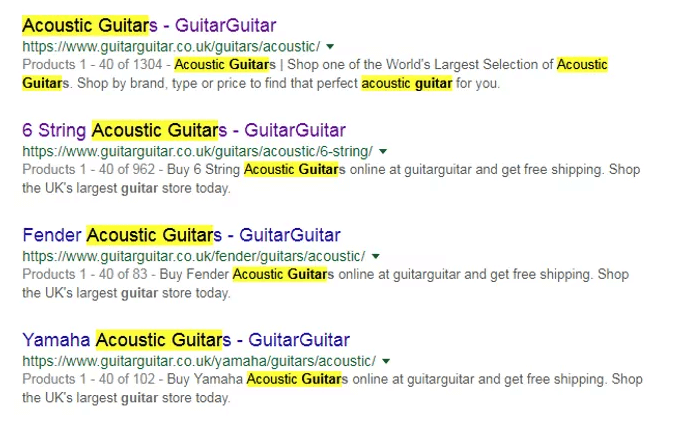
3. How to Identify and Remove Keyword Cannibalization
3.1. Implement an External Linking Campaign
There is the option to identify and eliminate keyword cannibalization in an indirect way, such as having external links and internal links. External links can leverage the SEO value of a page targeting one keyword. Make sure all of these pages have external links. Therefore, you are sharing external link value among different pages instead of focusing it into one. A well-thought link structure will strengthen your website.
Sort of: let your users choose the best page.
On the same notice, internal links can help boost certain pages and transfer value SEO internally. The more internal links pointing to one page of your website, the greater the value of that page within the website. For example, if you have a page with 20 internal links pointing to it, it will hold a greater value in the site than the pages with only 5 internal links
| Internal linking is a highly valuable strategy, both for SEO and for your site’s bottom line. Pay careful attention to how your links relate your pages to one another, and try to keep your navigation as intuitive and convenient as possible. | |
| JAYSON DEMERS | |
| Founder & CEO of AudienceBloom | |
3.2. Find and Optimize Weak Pages
While keyword cannibalization might carry some benefits for your website, it can hurt it really bad if your pages are weak. That means that you target two pieces of content that aren’t good enough, instead of focusing on creating a great piece, by responding to all the questions the user has and providing a higher value than your competitors do. Choose high-quality content instead of low-quality content. You’ll risk creating replicates and you’ll be drowning your own boat and decrease the chances to receive links.
Solution #1 To check which pages are weak and find out the keywords that rank low, you can use a Rank Tracking tool.
![]()
You have the option to track keywords on multiple browsers, countries and devices for the same website. It is very easy to use and add tags and filters to see the keywords you are interested. Tracking your keywords a global, local and mobile level, the tool gives you a complete view of your keyword performance and the search volume data.
To spot the weak pages look at the keywords that rank on the second or third page. Make a list with those keywords and pages so you can use them to optimize the pages (you’ll discover how to do it at #4. How to Prevent Keyword Cannibalization).
Solution #2 Another option for spotting low-quality pages is by measuring your content in Search Console. You can look here by going at Search Traffic » Search analytics to find the pages that rank on the second and third page because these ones have a higher chance to get faster on the first page.
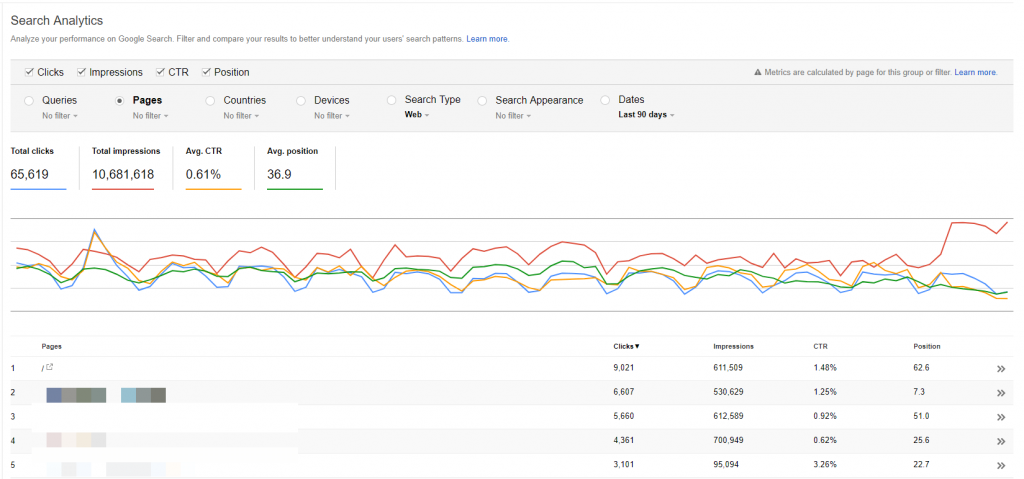
Make sure you select to see clicks and positions for those search queries. Impressions and CTR are other two options for your queries.
In case you want to find the specific pages Pages » Filter Pages and paste the URL.
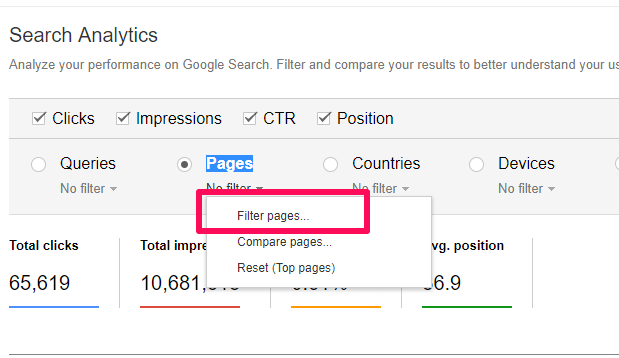
Google Search Console shows a few data about your onsite SEO such as your page title tags and meta descriptions that are duplicated. Simply go to Search Appearance » HTML Improvements. They can be easily reviewed by clicking on them.
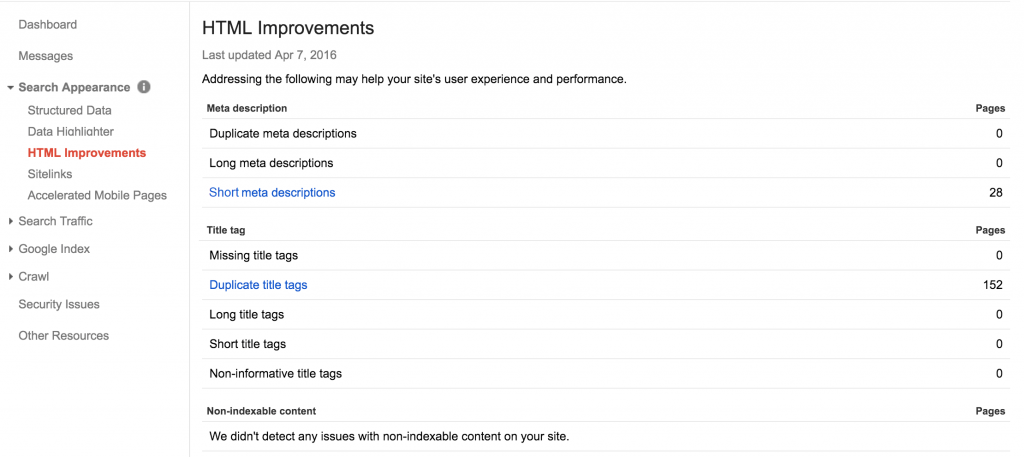
After you made a list of pages that rank low, put the list next to the first one, generated from Rank Tracking,in an excel file for each page, save the positions, the date when that position was registered, the CTR, if you have it, along with the volume search.
To prevent that situation and identify if you’re having keyword cannibalization with duplicate content, we’ve come up with a solution.
4. How to Solve Keyword Cannibalization
There are multiple ways to avoid and fix keyword cannibalization.
The first one is optimizing both pieces of articles to increase their chances to rank and make a difference between them to avoid duplicate content through the strategies you apply. Or, in case you can differentiate those two, combine the information and create a single piece of article which is stronger and more valuable. You can move the content from one article to another, and create 301 redirects so you won’t lose any traffic and links.
For content optimization, Content Assistant can work wonders to outperform your competitors.
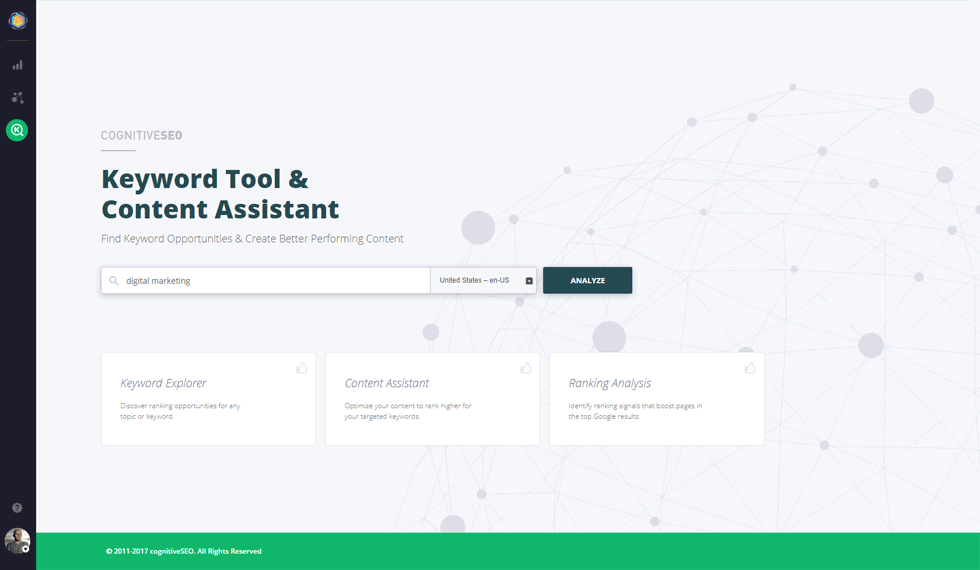
The tool works on the idea of a content performance score, which evaluates all the content for the first 100 positions for a specific query and gives some keyword recommendations that can help you increase your rankings if included in your article. Performing keyword research, competitor spying and content optimization check can be done in 3 easy steps with this tool.
The process starts with a keyword research by typing a keyword that you want to see the search volume of and get a few recommendations. Then it will lead you to a list with the pages that rank for that specific query. Here, you can do keyword tracking and have a look at the keywords used by each page. After you got an idea and have some insights from your competitors, you’ll get to the final step where you can optimize your article. Import it and look at the search results.
Below you can see an example of an un-optimized page:
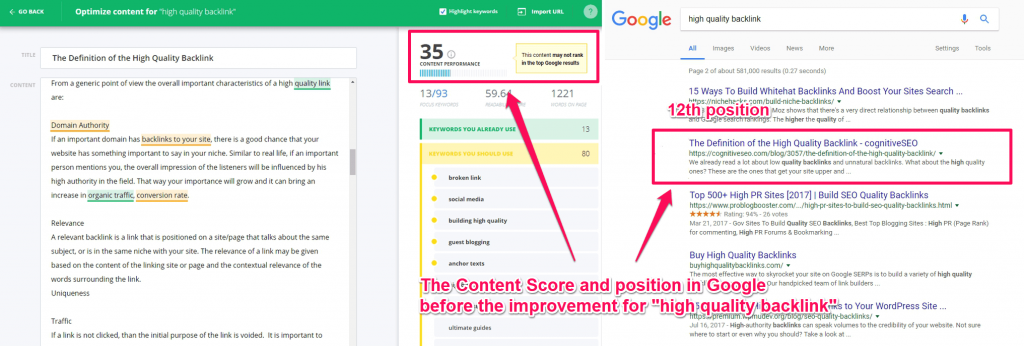
After adding some keywords form the list, by placing them as synonyms or adding new text that contains those keywords, we’ve had a beautiful surprise of seeing an improvement in rankings.
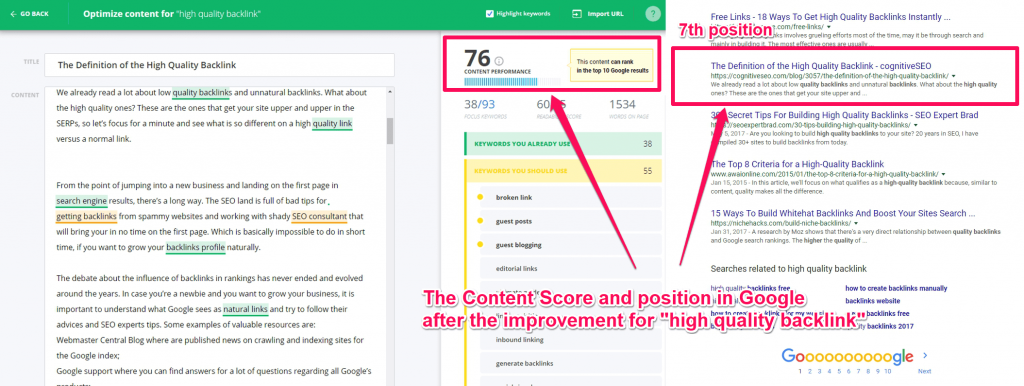
So, if you want to optimize both your pieces or articles or combine and mix them, you can use a tool to help it get to the best form possible.
There are other solutions if your website suffers from keyword cannibalism that could seem more drastic. For example, if you find an article that is outdated and outranks a more accurate one you can remove the old article and redirect it to the new page.
De-optimization is another solution. You have the possibility to de-optimize the pages that rank for particular keywords that you don’t want to rank for. There is the possibility to remove the keywords where possible and replace them with different words. Also, updating internal links might be needed to make sure the links do not include the main keyword in the anchor text.
Canonical tags can make your website more efficient and guide search engines on which pages they should prefer. If you have multiple pages targeting the same keyword, then you can use canonical tags to inform them which page you want to rank for that single keyword.
Conclusion
Keyword cannibalization started to be the bad guy in the content and SEO world when web spammers used it defectively to increase rankings for lots of pages with the same content on the same keyword, I’m guessing they did that because link building didn’t seem to be interesting for them. We all know how important content and links are (Google said they are in top 3 ranking factors), and spammers discovered that in the early days.
The good part in all this dreadful situation is that keyword cannibalization isn’t and issue or the actual bad guy (it doesn’t have to be). It can be Batman. It can be an opportunity for strong pages. Otherwise, all of your cannibalization issues can be resolved if you mix the content, remove the old blog post and redirect it. On the long run, a keyword strategy and a content map for your websites will avoid similar situations. And never forget about user experience, because the user is the king that makes the rules.
All of the methods we recommended are very good to be taken into consideration. It’s apt to you what you decide. May your decision push your rankings higher!

 Site Explorer
Site Explorer Keyword tool
Keyword tool Google Algorithm Changes
Google Algorithm Changes

I read something recently that said in some cases you should actually just delete content completely – what do you think about that? I’m kinda hesitant to go around basically “destroying” sites I’ve worked so hard to build, but I suppose if it’s something that’s in the best interest of those sites (and my bottom line) then it might just be a sacrifice that must be made.
It depends on what context you heard it.
I don’t think it would be a solution. You can either remake the content or redirect it to other pieces of content. Or try the solutions I’ve explained in the blog post.
Good luck!